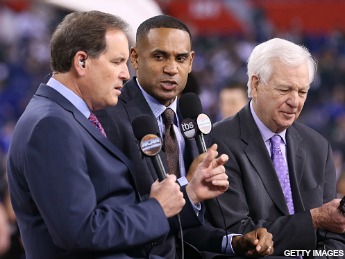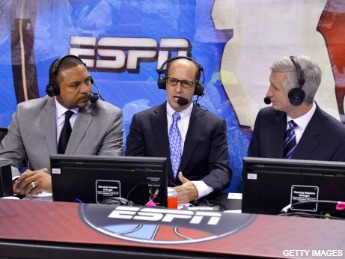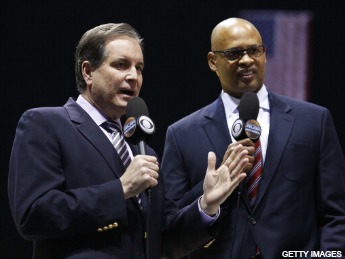You could probably read the transcript of a college basketball game broadcast and know whether Clark Kellogg is the commentator. Kellogg has a fondness for inventing and popularizing phrases that have become a part of the basketball lexicon.
Kellogg has a penchant for imploring players to "squeeze the orange." He'll refer to productive basketball players as "stat-sheet stuffers." And when it comes time to put some points on the board, he'll talk about how a given team can "score the ball."
For some, these inventions of language are nothing more than fun characterizations of the game -- simple ways to enliven the broadcasts. For others, the phrases are grating and annoying, for their grammatical dysfunction and/or their general silliness.
Critics would point out that "squeezing" is just a more dressed-up way of saying "holding," and that it's a stretch to liken a basketball to an orange. They'll argue that the distinction of stuffing stat-sheets is too vague to carry any meaning -- are they points, rebounds, turnovers, all three?
And when it comes to scoring in basketball, you score with the ball -- scoring implies that the ball is used. The complaints can get nit-picky, but during the course of hours-long games stretching across half the calendar year, small frustrations can add up quickly.
Except linguistic experts would argue that these turns-of-phrase are nothing to get worked up about.

"In the case of sports broadcasts in the US, there is an overarching motivation to avoid dead airspace, so using more words is preferable over using fewer," says Dr. Bob Kennedy, a linguistics lecturer at UC-Santa Barbara.
Kennedy contends that the viewer demands placed on broadcasters can morph the way those broadcasters talk. Unlike print journalism, where brevity is emphasized, broadcast journalism is tasked with providing constant coverage -- and coverage that is entertaining and diverse, too.
Variety in discussing the game is important, but many of those actions are repeated over time. The use of different phrases -- sometimes replacing "hold on to the ball" with "squeeze the orange" -- diversifies the conversation and avoids a sense of monotony in the game.
At the same time, Kellogg and other broadcasters aren't merely conveying the game to the television audience.
"Probably a more important constraint for the sportscaster is to sound like a credible sportscaster, independently of hipness, and if 'score the ball' sounds like something basketball experts would say, then that is motivation to use it," Kennedy says.
The circumstances of broadcasted sporting events do offer some explanation for why such phrases and terms are created over time, but that doesn't necessarily mean they make grammatical sense.
Except, in this case, Kennedy says they do.

The details can get overwhelming quickly. Put it this way: Grammar functions as a set of rules, sure. But those rules allow for innovation and change.
"Languages changes over time, sometimes divergently," says Kennedy, who emphasizes the "flexibility of language." He looks at the phrase "score the ball" and sees it as an instance of a transition construction of words used in an intransitive way.
It's not quite as simple as "I before E, except after C."
"As a parallel, we usually say something 'happens to someone,' but in some varieties of English, 'something happens someone,'" Kennedy says. "'Score the ball,' then, is an intransitive form of 'score with the ball.'"
It makes perfect linguistic sense, at least to linguistic scholars.
As for the redundancy of the phrase -- scoring in basketball implies the ball is used -- Kennedy doesn't go as far as saying "score the ball" is redundant, and he doesn't think it would matter anyway.
"Redundancy is not inherently a bad thing, and certainly not the same as bad grammar," Kennedy says. "Redundancy is a way of ensuring your point gets across.

"Whoever is responsible for the maxim that redundancy is to be avoided was actually not attuned to actual grammar ... redundancy can be really functional."
Despite the numerous phrases, terms, slang and other lingo that is unique to the sports world, the basic rules of language do seem to apply. Words and phrases are invented and adapted according to various applications and purposes. Sometimes the words catch on and become more integral to language. Other times, they slip off into obscurity.
"Score the ball," "squeeze the orange" and other pet phrases may seem superfluous, but they exist for the practical purpose they serve -- even if that purpose is merely to enliven broadcasts. But the linguistics of sports does feature some wrinkles that don't apply to language at large.
"There are two things that emerge in sports contexts: Obviously, the vocabulary that you use in sports is very adapted to its setting, but so is its syntactic structure. That is, coaches, for example, may use a lot of repetition, brief sentences, and questions. Broadcasters use a lot of structures that drop subjects, or verbs, or both."
That doesn't mean fans have to like those broadcasting turns of phrase. They just can't lean on the grammar argument.





